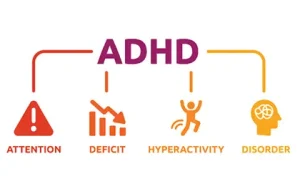Overview
Attention-deficit/hyperactivity disorder, commonly known as ADHD, is a long-term neurodevelopmental condition that affects millions of children worldwide and often continues into adulthood. The disorder is marked by an ongoing pattern of inattention, hyperactivity and impulsive behavior that interferes with daily functioning and development.
Children with ADHD may struggle with focus, self-control and staying organized. These challenges can affect academic performance, relationships and self-esteem. Although symptoms may improve with age, some individuals continue to experience ADHD-related difficulties throughout life. While ADHD cannot be cured, appropriate treatment and support can significantly reduce symptoms and improve quality of life. Early diagnosis, education and structured treatment plans play a key role in long-term outcomes.
Symptoms
The core symptoms of ADHD include difficulty paying attention, excessive activity and impulsive behavior. Symptoms typically begin before the age of 12 and may appear as early as age 3 in some children. The severity of symptoms can range from mild to severe and must be present in two or more settings, such as home and school, to meet diagnostic criteria. These symptoms interfere with normal development, daily activities and social functioning, and they may persist into adulthood.
ADHD is diagnosed more often in boys than in girls, though symptom patterns can differ. Boys are more likely to show hyperactive and impulsive behaviors, while girls may display quieter forms of inattention that are less easily noticed.
There are three main types of ADHD.
Predominantly inattentive type is characterized mainly by difficulties with focus, attention and organization.
Predominantly hyperactive-impulsive type involves excessive movement, restlessness and impulsive actions.
Combined type includes symptoms of both inattention and hyperactivity-impulsivity.
Children with inattentive symptoms may frequently:
-
Make careless mistakes or miss details in schoolwork
-
Have difficulty staying focused on tasks or play activities
-
Appear not to listen when spoken to directly
-
Struggle to follow instructions or complete assignments
-
Have trouble organizing tasks and managing time
-
Avoid tasks that require sustained mental effort
-
Misplace items such as school supplies or personal belongings
-
Become easily distracted by unrelated thoughts or activities
-
Forget routine daily responsibilities
Children with hyperactive and impulsive symptoms may often:
-
Fidget, squirm or tap hands and feet
-
Have difficulty remaining seated when expected
-
Be constantly in motion or appear restless
-
Run or climb in inappropriate situations
-
Find it hard to engage in quiet play
-
Talk excessively
-
Interrupt others or blurt out answers
-
Struggle with waiting their turn
-
Intrude on conversations or activities
Typical Development Versus ADHD
Periods of inattention, high energy or impulsive behavior are common in most children and are often part of normal development. Preschool-aged children naturally have short attention spans and high activity levels. Even in older children and teenagers, attention and focus may vary depending on interest and environment.
A child should not be labeled with ADHD simply for being energetic or different from peers. When difficulties are limited to a single setting, such as only at home or only at school, other factors may be contributing. ADHD is considered when symptoms are persistent, occur across multiple settings and significantly affect learning, behavior or relationships.
Causes
The exact cause of ADHD is not fully understood, but ongoing research suggests that multiple factors play a role. These may include genetic influences, environmental exposures and differences in brain development or function, particularly during critical periods of growth.
Risk Factors
Several factors may increase the likelihood of developing ADHD:
-
Having a close family member with ADHD or another mental health condition
-
Exposure to environmental toxins such as lead, commonly found in older buildings
-
Prenatal exposure to alcohol, tobacco or recreational drugs
-
Premature birth
There is no scientific evidence that sugar causes ADHD. While many childhood conditions can affect attention and behavior, these do not automatically indicate ADHD.
Complications
ADHD can significantly impact a child’s daily life and long-term well-being. Children with ADHD may experience:
-
Academic difficulties that lead to poor grades or negative feedback
-
Increased risk of accidents and injuries
-
Low self-esteem and reduced confidence
-
Challenges forming and maintaining peer relationships
-
Higher risk of substance misuse and legal problems in later life
-
Increased risk of sleep disorders
-
Greater likelihood of experiencing suicidal thoughts
Conditions Often Linked With ADHD
ADHD does not cause other mental health or developmental disorders, but it commonly occurs alongside other conditions. These may include oppositional defiant disorder, conduct disorder, disruptive mood dysregulation disorder, learning disabilities, substance use disorders, anxiety disorders, obsessive-compulsive disorder, mood disorders such as depression or bipolar disorder, autism spectrum disorder and tic disorders.
Prevention
There is no guaranteed way to prevent ADHD, but certain steps may help reduce risk. During pregnancy, avoiding alcohol, smoking and recreational drug use supports healthy brain development. Protecting children from exposure to environmental toxins, including cigarette smoke and lead, is also important. Limiting screen time in early childhood may be beneficial, although definitive evidence is still limited.
Advertisement

